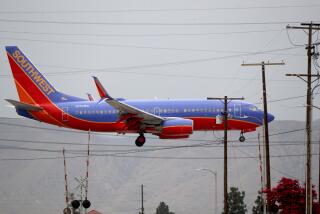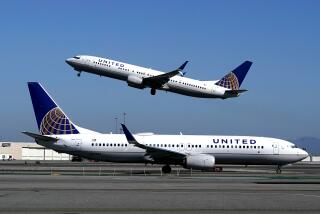On the Spot: When to call the airline and when to call the OTA
Horrendous storms. Political unrest. Sleep deprivation. Those are some of the issues that have tripped up travelers this summer. The travel@latimes.com inbox overflows with readers’ complaints about various airlines, of course, but this year we’ve seen another theme that involves trouble when that traveler has booked through a third party — that is, not directly with the airline. Taking a deep breath, we’ll plunge in and try to explain how to deal with troubles that might befall you if you’ve booked through an online travel agency, then entice you with an upcoming tale of the low-cost-but-riskier consolidator ticket.
When it comes to travel plans that get disrupted, some are out of our control (Mother Nature, dissent in the country you’re visiting) and some are not (you are so sleep-deprived that you’ve overslept and missed your flight).
Readers sometimes say they are getting ping-ponged between the airline and the online travel agency, or OTA (and when we say that, we mean such companies as Expedia, Travelocity and Orbitz, among others). When there’s a tough task to face, who will help the little red hen?
“Airlines and OTAs have this weird, symbiotic relationship,” said Rick Seaney, co-founder and chief executive of FareCompare.com, an airline ticket comparison site. “As soon as a ticket is purchased and money transacted, it’s a shared ownership between these airlines and online travel agencies.”
But getting help depends a bit on where you are in the travel process.
If you’re already checked in and you have a problem, whether it’s self-inflicted (missed your flight) or out of your control (something is messing with your scheduled flight), the airline should deal with you, said Joel Frey, a spokesman for Travelocity. If you’re “trying to make a connection, then, yes, they should work directly with the airline and go to the airline’s ticket counter.”
But if you’re not checked in and you’ve bought an airline ticket through an OTA? You need to go to the OTA, Frey said.
Here’s where you may feel some ouch: Airlines will charge you a fee if you’re changing your plans — whether it’s because your dog is sick or you feel apprehensive about travel (airlines/OTAs generally don’t care about your anxiety level, except when it’s warranted — more on that in a minute) or you simply changed your mind about wanting to go to Hawaii, in which case you may want to consult a therapist.
Those airline change fees have increased in recent months to as much as $200 for a domestic ticket, more for international tickets. Besides that fee, the OTA is likely to charge you a fee. Travelocity’s is $40, Frey said.
Airlines will occasionally waive those change fees, especially in the case of calamitous storms or political unrest that is undermining a country’s stability. That latter category can be tricky; it doesn’t matter if you feel uneasy, but if you see that airlines are willing to waive change fees, that’s your clue that you can change your airfare (but not necessarily cancel and get a refund, which is a whole different topic).
If you’re abroad and you need to change your ticket back home and you haven’t checked in? You’ll need to call your OTA in North America, assuming that’s how and where you booked your ticket. George Hobica, the founder of Airfarewatchdog.com, which specializes in finding low-cost airfares, reminds travelers not to pick up the hotel room phone and call that OTA.
That’s when you need Skype or another long-distance service that allows you to call the U.S. for significantly less than you could from your hotel room or from your roaming cellphone.
Both Hobica and Seaney had plenty to say about consolidator and bulk tickets. Those tickets have their own rewards and disadvantages, and we’ll talk about those in next week’s column.
Have a travel dilemma? Write to travel@latimes.com. We regret we cannot answer every inquiry.
More to Read
Sign up for our L.A. Times Plants newsletter
At the start of each month, get a roundup of upcoming plant-related activities and events in Southern California, along with links to tips and articles you may have missed.
You may occasionally receive promotional content from the Los Angeles Times.







